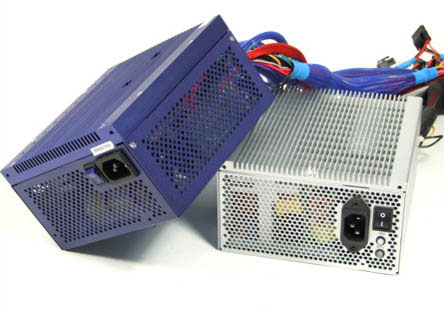Silent PSUs: Fortron Versus Silverstone
Passive Power Supplies In The Lab
If you want a computer to truly be silent, you need to use passive cooling components. Whereas passive cooling components are more frequently available in the graphics card and CPU sector, they are something of a niche market when it comes to power supplies. This is not really a surprise though, given that purely passive units are considerably more expensive than those with fans, and they generally provide relatively poorer performance as well.
Our test compares the Zen 400 from Fortron (FSP) with a power output of 400 watts, and the Nightjar 450 from Silverstone which provides a maximum of 450 watts. Both models can be purchased for less than $200.

In order to ensure proper comparison of the units—and in anticipation of future testing with other units having different power output levels—we tested the efficiency at 100%, 50% and 20% load. In the future, we will also be testing the efficiency at an output of 250 watts, as well as an extremely low output of just 35 watts. The latter is of particular importance for low power systems, to ensure that users are able to find the right kind of power supply for these as well.
Get Tom's Hardware's best news and in-depth reviews, straight to your inbox.
Current page: Passive Power Supplies In The Lab
Next Page Fortron/FSP Zen 400-
knowom I think they'd be great for a digital audio workstation environment now if only there was some more competition in this market segment to drive prices down to a more decent level.Reply -
mdmadph "The +12V CPU connection is only available as 4-pin version, which can lead to problems with some boards that require an 8-pin connection."Reply
Know of many HTPC boards that need an 8-pin CPU connection? :\ I sure don't. -
I have read 3-4 other reviews of the zen 400W, and I'm pretty sure there has been no mention of the high pitched sound. It's not a good sign for the zen, but it's probably a faulty powersupply tested in this review.Reply
-
gwolfman Ummmm, so where's the temps? The review is practically pointless without temp measurements on a fanless PSU. BOOOOO!Reply -
jeffunit Without specifying the input voltage, efficiency measurements are pretty useless. Running at 240v will yield a few percent higher efficiency than 120. Even 240v will be more efficient than 220v.Reply -
kittle Re-run your review and include tempratures. Its pointless w/o them.Reply
If you have found a fanless PSU thats safe to touch -- thats great. but if these things get to 40, 50, 60c - then we need to know not to buy them. -
I own the Zen400 power supply and it's exactly what I needed for a quiet HTPC, to the point where it's literally impossible to tell when the PC is on. During normal operation I have never heard the high pitched sound this review mentions (although it did output a sound similar in volume and annoyance to a smoke alarm when I failed to plug in the power cable to the graphics card - it was clearly an error/failure tone).Reply
-
In regards to the lack of the 8 pin CPU 12v connector, if you can find a motherboard of which the 4 +12v pins of the port are not electrically connected, please point it out to actually justify needing the 8 pin connector. To be honest, a motherboard with a single +12v pin isolated to only 1 or 2 vcore phases would'nt be any motherboard you would want to purchase, for power efficiency reasons.Reply
-
Alternator I agree with the above posters, temps would be nice, and not just of the PSU...Reply
I am quite interested in getting a capable (above 400watt) PSU that doesn't require a fan, but I really need to keep an eye on the temperatures.
I have a fanless mb and vid card (3850 radeon), and would wonder if adding a fanless psu into the mix would jeopardise the system by reducing the air flow through the case. (after all I wouldn't get a fanless PSU if my other components were noisy to begin with!?)
Perhaps an article focused more on configuring a quiet computer (for the purpose of gaming) could be in order?